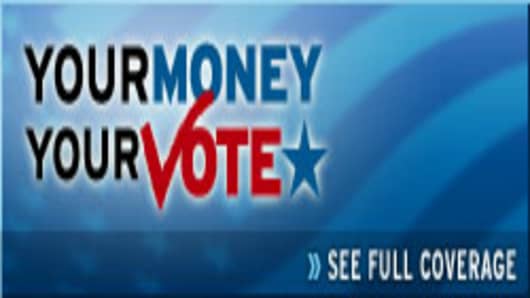Barack Obama's presidential election victory comes with an albatross of a prize—an economy beset by a stubborn housing slump and the worst financial crisis in 70 years.
Consumers and businesses are sharply reducing their spending and the government is awash in red ink.
"He will inherit an economy that is in recession and...is likely to get worse before it gets better," said Stuart Hoffman, chief economist for PNC Financial Services.
In the latest sign of recession, a report Wednesday said the US services sector—which represents roughly 80 percent of the economy—shrank far more than expected in October.
Also, private employers cut a larger-than-expected 157,000 jobs in October, a report by a private employment service said. On Friday, the government is expected to report 200,000 jobs were lost in October, bringing the total this year to nearly 1 million.
US stocks fell Wednesday, as did European shares, as investors, focused on the economy rather than the election, cashed in some of their gains from Tuesday's rally that sent the Dow Jones industrials up more than 300 points.
Asian stocks rallied as investors there were hopeful Obama would tackle the US financial crisis with renewed vigor, although some voiced concerns that a Democratic president and Congress might turn more protectionist.
For Investors
- Why There Is No Post-Election Rally
- The "Next Four Years" Trade
- Markets the Day After an Election
- The Market and Obama: Chandler
- Obama Win=Oil Up, Dollar Down
- First Move Should Be Save Autos: Ross
"Corporate America is buying into the recession story, and they are paring their investment spending accordingly," said Ken Mayland, president of ClearView Economics.
As a result, Obama's victory makes a new economic stimulus package—perhaps as large as $150 billion—more likely, economists said.
The U.S. Chamber of Commerce on Wednesday called on the current Congress to approve a stimulus measure this year.
"We have to get the economy back on track," said John Castellani, president of the Business Roundtable, in a television interview.
Concerns about the budget deficit, which could approach $1 trillion in the budget year that began Oct. 1, will likely take a back seat in the short term, economists said.
"It's going to be 'damn the deficit and full speed ahead on the stimulus,'" said Stuart Hoffman, chief economist at PNC Financial Services.
The Illinois senator has pledged to offset some expenditures by raising income taxes on families making more than $250,000.
Obama supported a $50 billion stimulus during the campaign that included funds for infrastructure spending and grants to state and local governments to prevent cuts to health, education and other services.
Hoffman said the stimulus will likely include an extension for unemployment benefits and potentially even permanent tax cuts for middle and lower-income families.
The economy, which many analysts believe is already in a recession, was foremost on most voters' minds Tuesday. Six in 10 voters said it was the most important issue facing the country.
Obama's victory means that industries such as oil and gas producers, utilities and pharmaceuticals may face greater regulation and even taxes, while labor unions and automakers are expected to benefit.
In addition, banks, insurance companies, hedge funds and the rest of the financial sector will almost certainly face a regulatory overhaul effort by the Democratic Congress next year.
Obama's reputation as a conciliator, meanwhile, will be sorely tested by the labor-backed Employee Free Choice Act, which would allow workers to form unions by getting a majority of employees to sign a card in support of a union, rather than through a secret ballot election.
Business groups such as the U.S. Chamber of Commerce fiercely oppose the measure because they say the elimination of the secret ballot would open up workers to intimidation and harassment.
The measure, supported by Obama and most Democrats in Congress, was approved in the House last year but stalled in the Senate.
Obama has promised to help Ford Motor , General Motors and Chrysler by doubling a recently approved loan program to $50 billion to help the auto industry develop more fuel-efficient cars.
Oil and gas companies such as Exxon Mobil and Chevron , however, could face a windfall profits tax, which Obama has promised to impose to pay for a $1,000 "emergency energy rebate" for families.
Also on energy, Obama proposes spending $150 billion over 10 years to speed the development of plug-in hybrid cars and "commercial-scale" renewables, such as wind and solar.
Under an Obama administration, pharmaceutical companies will struggle to defend the lucrative Medicare drug benefit, which pays for medications taken by 47 million elderly people.
Obama has pledged to allow the government to negotiate drug prices under the program directly with the pharmaceutical companies, saying it could save $30 billion.



